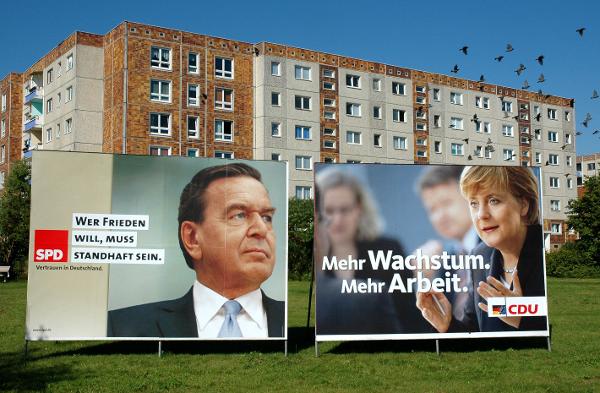Source

Source: picture-alliance/ ZB (c) ZB-FUNKREGIO OST
In the spring of 2005, the SPD suffered a disastrous defeat in the parliamentary [Landtag] elections in North Rhine-Westphalia, which had been an SPD stronghold for decades. In May, Chancellor Gerhard Schröder announced that he would seek early elections to the Bundestag. In the electoral campaign, Schröder and the SPD relied on his prestige as an incumbent. It seemed, however, that this wasn't enough – surveys predicted a governing coalition between the CDU/CSU and the FDP, with Angela Merkel as chancellor. On most key issues, Schröder advocated a moderate continuation of “Agenda 2010,” while Merkel called for quicker reforms to improve basic economic conditions. This photo shows SPD and CDU election posters in Grünhufe, a newly developed area in Stralsund in Mecklenburg-West Pomerania. The SPD's slogan – “Those who want peace must remain steadfast” – was meant to remind voters of Schröder’s categorical rejection of the Iraq war, a stance that had played a decisive role in the Red-Green victory in 2002. By contrast, the CDU poster – "More Growth, More Jobs" – highlighted the CDU’s economic expertise and suggested the thrust of the additional reforms it sought. The SPD unexpectedly won 34.2 percent of the second votes in the Bundestag election, thanks largely to Schröder’s personal campaign efforts. The CDU received 35.2 percent, winning the most votes by a very narrow margin.

Source: picture-alliance/ ZB (c) ZB-FUNKREGIO OST